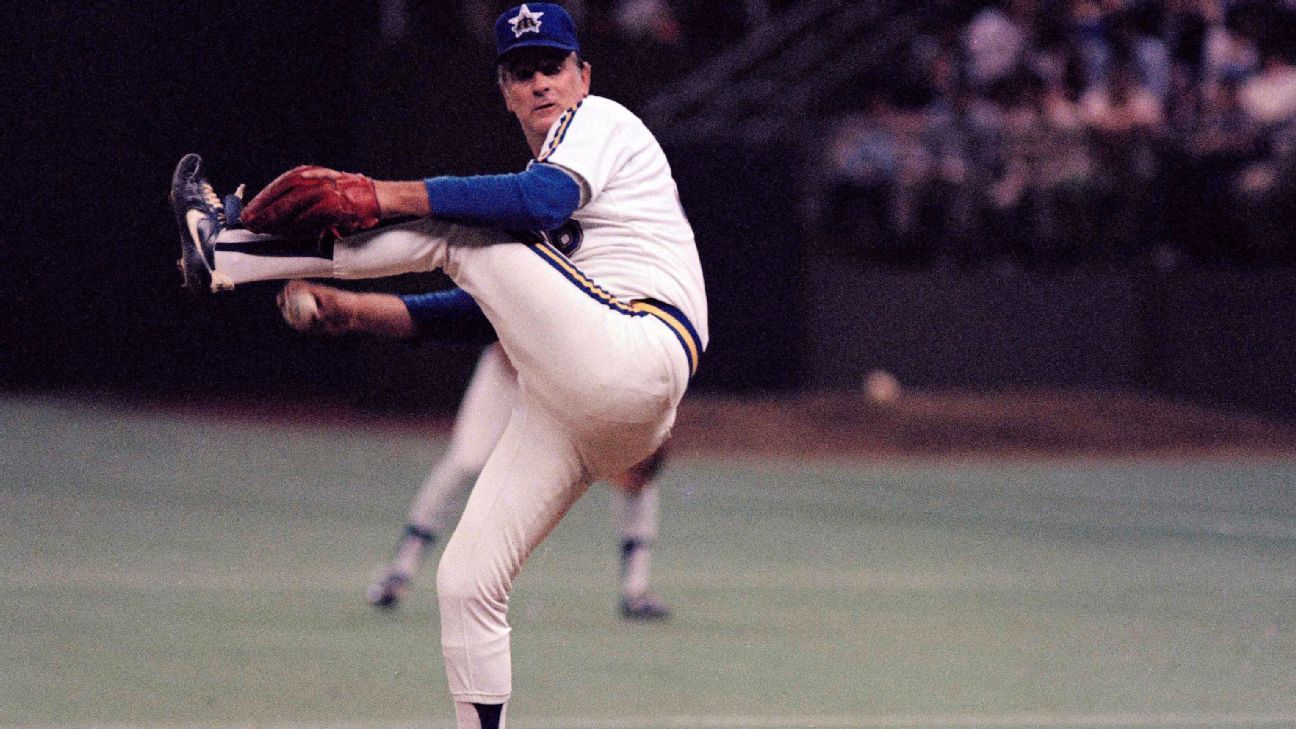In 1974, in Cleveland second baseman Duane Kuiper’s first month in the major leagues, he started for the first time behind veteran star pitcher Gaylord Perry. Seconds before Kuiper ran to his position to begin the game, Perry looked at him and said, “If you make an error behind me today, you’ll never play another day in the big leagues. Do you understand?!”
That was Gaylord Perry, who did so much more than throw a spitball. He had great stuff, he was a big, strong, rough, gruff farmer from North Carolina, he was irascible, wildly competitive and, like most great pitchers, really mean, fearless and hated to lose. He spoke freely even if it meant angering an opponent or teammate. He played for eight teams, during which time he asked to be traded, threatened to retire, nearly fought with teammate Frank Robinson and, in the famous Pine Tar Game in 1983, confiscated George Brett’s bat, was apprehended by umpires, and thrown out of the game. There was never any backing down by Perry, not from his debut at age 22 with the San Francisco Giants in 1962 or, 22 seasons later, at age 44, with the Seattle Mariners — he was the Ancient Mariner — and Kansas City Royals in 1983.
Which is why it seems unfair that Perry, who died Thursday at the age of 84, is often best remembered for throwing a spitball (even if his 1974 autobiography is titled “Me and The Spitter”). To some, that made him an overrated pitcher. More likely, more accurately, he was underrated.
Perry won 314 games with a 3.11 ERA and 3,534 strikeouts. The only pitchers in history who can match all three of those numbers are Walter Johnson and Tom Seaver. Perry was the first pitcher to win the Cy Young Award in each league — in 1972 for Cleveland and in 1978 at age 39 for the San Diego Padres. He and his brother, Jim, are the only pair of brothers to each win a Cy Young. Gaylord Perry won more games than any pitcher in the 1960s and ’70s combined. It took three attempts, but Perry was voted into the Hall of Fame in 1991.
“He was tough,” Hall of Fame outfielder Willie Stargell once said. “He was great. And he pitched angry.”
Of course, Perry did indeed throw a spitball, a pitch he allegedly learned in 1964 from teammate Bob Shaw. Opponents occasionally complained about him loading up. In 1973, New York Yankees manager Ralph Houk charged the mound and pulled Perry’s cap off his head. But at least one of his catchers in the 1970s said that Perry threw only two or three spitters per game, when he really needed a big out. Perry went through the same gyrations on the mound, appearing to touch his cap, his hair, his jersey. In retirement, Perry told me, “I wanted the hitters to think I might throw a spitter. If I could mess with their heads and their approach, I’d have a better chance of getting them out. And I loved getting them out.”
Perry was also remarkably durable. He threw 5,350⅓ innings, sixth most of all time, only 36 fewer than Nolan Ryan. For a nine-year stretch, Perry threw at least 300 innings in a season seven times in an eight-year span. For a 10-year period, he averaged over 300 innings pitched per season. He threw 53 shutouts, tied for 16th most with Jim Palmer, two fewer than Steve Carlton. Perry’s 1.181 WHIP also is in the top 20 all time, just ahead of the great Bob Gibson.
“There were so many great pitchers in the National League in the ’60s and ’70s,” former teammate Willie McCovey once said. “We had one of the very best on our team in Juan Marichal. Not everyone appreciated Gaylord. Every time he pitched, I thought we’d win.”
About the only thing Perry — also a basketball and football star in high school in North Carolina — didn’t do well was hit: he finished with a career .131 average with six home runs. But in 1964, a writer told Giants manager Alvin Dark that Perry, then 24, was a good hitting pitcher, and might hit a home run someday. Dark responded, saying, “Mark my words, a man will land on the moon before Gaylord Perry hits a home run.”
Five years later, at 1:17 p.m. Pacific time on July 20, 1969, Apollo 11 landed and Neil Armstrong and Buzz Aldrin became the first men to set foot on the moon. Thirty minutes later, roughly 238,900 miles away, in the third inning at Candlestick Park, Perry hit his first major league homer, a blast off the Dodgers’ Claude Osteen.
Three years later, Perry was traded by the Giants to Cleveland in a deal for ace Sam McDowell, who would win 19 games the rest of his career. Perry would win 180. Perry is still beloved in San Francisco, where a statue of Perry was unveiled at Oracle Park in 2016, in honor of the 10 years he spent there to start his career.
Kuiper, always playful, now calls games for the Giants and once had someone take a picture of him saluting Perry’s statue. The first salute, as he recalled the veteran pitcher threatening him before that start in 1974, was the middle finger variety. The second was a salute of a respect to a great, great pitcher.
